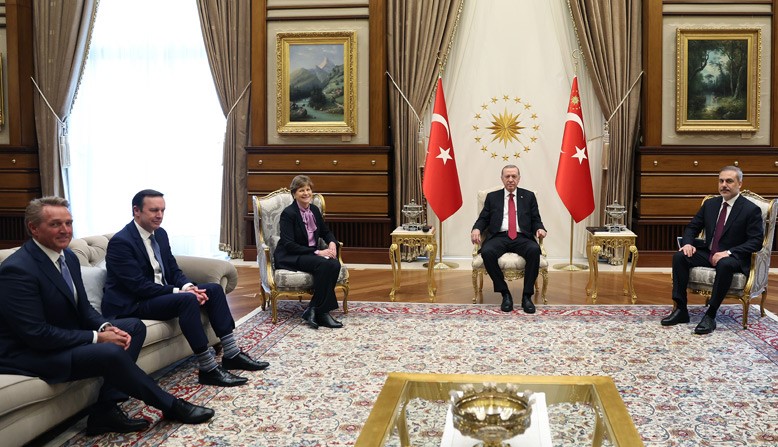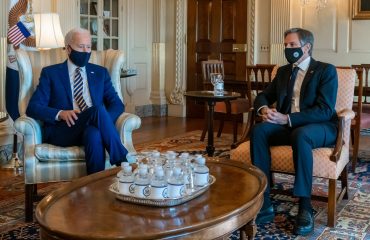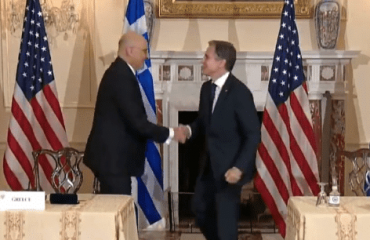

President Tayyip Erdoğan received US Senators on February 20, 2024. From left to right: Jeff Flake (US Ambassador to Ankara), Senator Chris Murphy, Senator Jeanne Shaheen, Erdoğan, Foreign Minister Hakan Fidan. (Photo: Presidency)
President Tayyip Erdogan’s meeting with US Senators Jeanne Shaheen and Chris Murphy at the Presidential Palace on February 20 should not go unnoticed. The meeting was attended by Foreign Minister Hakan Fidan and US Ambassador to Ankara Jeff Flake.
It was learned that Chris Van Hollen, a prominent figure in the Greek lobby in the US Congress, was also supposed to attend the meeting where Foreign Minister Hakan Fidan and US Ambassador to Ankara Jeff Flake was present. He could not attend due to health reasons.
Van Hollen had previously approved the sale of F-16s to Türkiye after receiving assurances from US officials that these aircraft would not be used against Greece in the Aegean. However, these reports were denied by sources from the Ministry of National Defense.
Diplomatic sources indicate that Shaheen and Murphy are working towards the sale of F-16s to Türkiye. Murphy described the visit on his social media account as a “moment of momentum” in Türkiye-US relations.
Shaheen, in recent years, has played a role in sensitive junctures of Türkiye-US relations. We will delve into the details shortly. Therefore, it is possible to interpret this visit as a sign of such a juncture.
Objective: Ukraine, Target: Russia
After attending the Munich Security Conference, Shaheen and Murphy planned a visit covering three countries: Hungary, Moldova, and Türkiye. Shaheen announced the purpose of the visit as strengthening the NATO alliance on her Senate webpage.
The primary goal in Hungary was to persuade Prime Minister Viktor Orban to approve Sweden’s NATO membership. Orban did not grant a meeting to Shaheen and her delegation (Senator Thom Tillis was also in the delegation in Budapest) and refused to discuss the issue of Sweden. His intention was to demonstrate that the Swedish Prime Minister had to come to him despite criticisms of one-man rule in his EU member country.
The US senators couldn’t meet with Orban, but interestingly enough, during that time, Swedish Prime Minister Ulf Kristersson announced his visit to Hungary on February 22. Orban also declared that Sweden’s membership would be voted on in the Hungarian Parliament on February 26. Nevertheless, during the visit, they were eager to see what Kristersson would say and what the Swedish media would report.
After meeting with Moldovan President Maia Sandu during their stop in Moldova, Murphy wrote on his Twitter account, “If Ukraine loses due to the US cutting aid, Moldovans know they will be the next target.”
Shaheen doesn’t come for nothing
American politician Jeanne Shaheen has visited Türkiye several times before. For example, on July 29, 2018, US Senators Lindsey Graham and Shaheen were in Ankara. President Erdogan met with them at the AK Party headquarters.
At that time, the top political agenda item was the release of Pastor Andrew Brunson, who was detained on charges of collaboration with FETO and espionage after the attempted coup on July 15, 2016. The purchase agreement for S-400s from Russia was also on the agenda. Türkiye had not yet been removed from the F-35 program by the US. Erdogan addressed President Donald Trump with an offer to exchange Fethullah Gulen and Brunson, saying, “Give us the pastor, take the pastor.”
So what happened next? Brunson received a light sentence on October 12, 2018, and, as if waiting for his release, boarded a US plane in Izmir on October 13, flying to his country via Germany.
At that time, it was Syria; now, it’s Russia
Shaheen and Graham were in Ankara again on January 18, 2019. This time, they were welcomed almost like heads of state. Moreover, just five days earlier, on January 13, Trump had tweeted, referring to Türkiye’s operations in Syria, “Will devastate Türkiye economically if they hit Kurds,” and the Turkish lira had lost value against the US dollar.
So what happened next? After Graham and Shaheen left Türkiye, on July 2, they visited the US soldiers stationed in Manbij, where the Syrian branch of the PKK, the YPG, was located at that time.
Shaheen considered Türkiye’s operations in Syria a threat to regional peace. Meanwhile, the delivery of S-400s from Russia had begun. Trump threatened the Turkish economy again, and the process of removing Türkiye from the F-35 program began.
Now, the top agenda item of the US is Ukraine. There is a debate in the US Congress about whether to continue providing military aid to Ukraine. The aid provided by the US and Europe to Israel to continue its horrific operation in Gaza is diverting attention from Ukraine. Shaheen and Murphy are in favor of continuing aid to Ukraine.
Let’s see what will happen?
The purpose of this trip seems to be the continuation of Türkiye’s support for Ukraine and restraining Russia. As a reminder, when asked about the postponed visit of Russian President Vladimir Putin to Türkiye on February 12, the statement came from the US was not as harsh as some expected. The US was saying something that might mean: “Erdogan will explain our concerns to Putin.”
Diplomatic sources convey Foreign Minister Fidan’s messages to US senators under three headings:
1- The US should use its influence to restrain Israel; the Gaza Crisis could spread to the region.
2- The US’s cooperation with the PKK in Syria is unacceptable; a strategic perspective is needed.
3- Türkiye is doing its part in grain shipments from Ukraine. The security of the Black Sea is vital for Türkiye. We will not allow any move that will increase tension in the Black Sea.
The last one is especially important because US sources have been urging the passage of NATO ships through the Bosporus Strait in violation of the Montreux Convention for some time. Ankara, however, insists on not allowing this, arguing that coastal NATO members Bulgaria and Romania can ensure the security of the Black Sea, which would also be beneficial for Ukraine’s security.
Let’s see what developments will occur between Türkiye and the US after Shaheen’s visit? It hasn’t been in vain so far.


